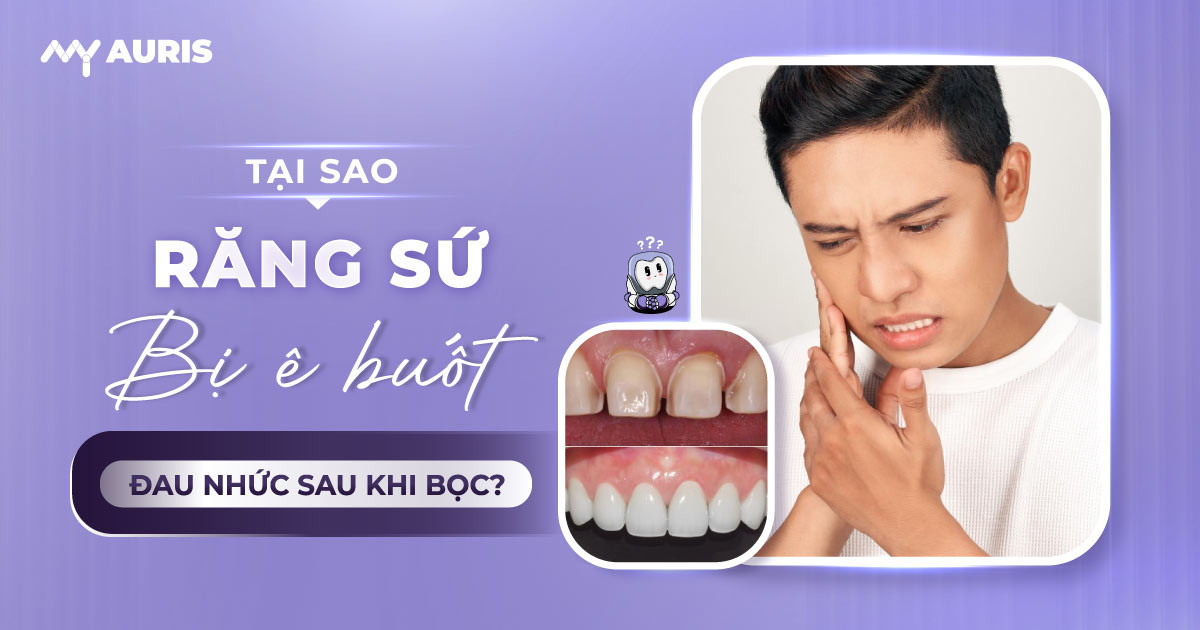Tooth sensitivity after porcelain crown/veneer placement is a common condition experienced by many after dental restoration. Common symptoms include sensitive teeth and pain when eating hot, cold, or sour foods, or when chewing. If the sensitivity lasts longer than 1 week, especially in individuals with weak enamel or gum inflammation, it is necessary to consult a dentist soon.
What is tooth sensitivity after porcelain crown/veneer placement?
Tooth sensitivity after porcelain crown/veneer placement is a common phenomenon that occurs after a patient undergoes porcelain dental restoration. This condition usually manifests as sensitive teeth, with transient or prolonged sharp pain when exposed to hot, cold, sour foods, or during chewing. While this is a common reaction after the crowning procedure, prolonged sensitivity should not be taken lightly.
The degree of sensitivity after porcelain crown/veneer placement also depends on each individual’s natural tooth sensitivity. Some people experience only mild sensitivity in the first 1–2 days, while others may experience it for over a week. Individuals with thin or weak tooth enamel, or those who have previously experienced gum inflammation or periodontitis, have a higher risk of experiencing sensitivity.
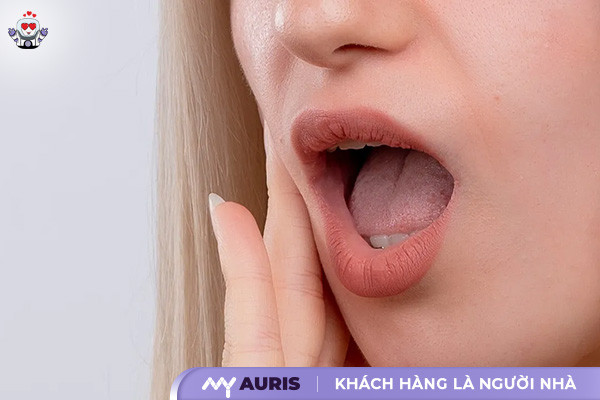
Why do porcelain crowns/veneers cause sensitivity?
To effectively address it, the first step is to understand the causes of sensitivity after porcelain crown/veneer placement:
Excessive tooth reduction, exposing the pulp
During the crowning procedure, the dentist needs to reduce a portion of the natural tooth to create space for the porcelain crown. If too much tooth structure is removed, the enamel and dentin layers can be damaged, making the pulp susceptible to irritation. This leads to prolonged sensitivity, especially when consuming cold or hot foods and drinks. This is a common technical error if the dentist lacks experience or does not accurately assess the tooth’s sensitivity.
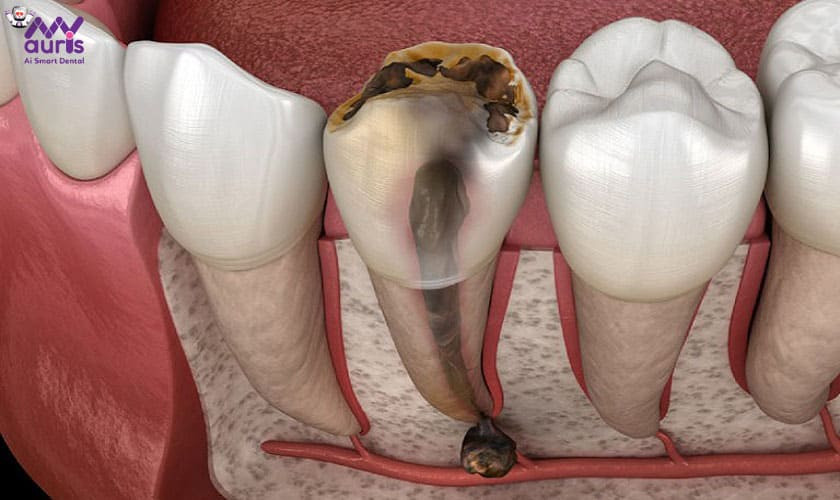
Improper or incomplete root canal treatment before crowning
For teeth with prior signs of pulp inflammation, if the pulpitis is not thoroughly treated before proceeding with crowning, the tooth will react with severe pain or sensitivity afterward. This condition can lead to infection, affecting both gum tissue and the entire oral system. This is a serious cause that requires retreatment with endodontic techniques and crown replacement if necessary.
Crowns that do not fit snugly against the gums or natural tooth
If the porcelain crown is not precisely fitted, leaving gaps at the tooth margin or being loose, it creates an environment for bacteria and food particles to infiltrate. This can lead to gum inflammation (gingivitis) and periodontitis after crowning, resulting in sensitivity, pain, or root sensitivity. Furthermore, insecure dental cement can cause the crown to shift during chewing, putting pressure on the natural tooth.
Allergy to materials or dental cement
Some individuals may react to the dental cement or the porcelain material used. Symptoms typically include dull, unexplained sensitivity. Severe cases may lead to mild soft tissue inflammation or require replacement with a different type of porcelain that is more compatible with the patient’s body.
Congenitally sensitive teeth or due to physiological factors
Some people naturally have high tooth sensitivity. After crowning, even with proper technique, they may still experience temporary sensitivity. This usually lasts 1–2 weeks after the procedure and gradually subsides with proper post-crowning dental care. However, if the sensation does not diminish, it is necessary to revisit the dental clinic for a check-up.
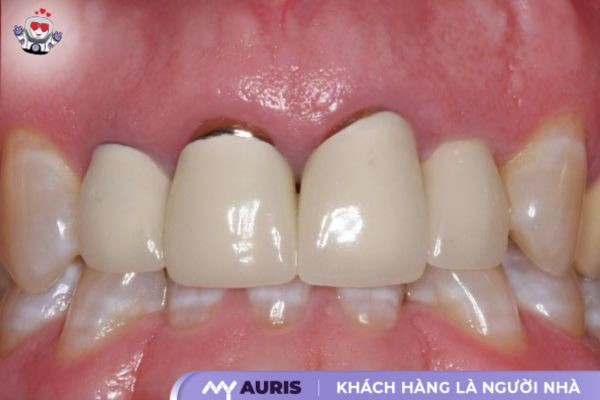
Incompatibility with the type of crown used
Everyone has different tooth structures. If the wrong type of porcelain is chosen – one that is too hard, too thick, or highly conductive of heat – sensitivity is more likely to occur. In some cases, it’s necessary to compare different types of porcelain crowns before making a choice to reduce risks. Dentists should provide thorough consultation on the porcelain material, its thermal conductivity, and its compatibility with the tooth structure.
Effective Home Remedies to Reduce Tooth Sensitivity After Porcelain Crown/Veneer Placement
With proper care, you can safely and effectively reduce this sensitivity at home.
Use toothpaste for sensitive teeth
One simple and effective way to reduce sensitivity is to change your toothpaste. Choose brands with ingredients that help soothe tooth enamel, protect gum tissue, and reduce irritation. These products often contain potassium nitrate or stannous fluoride, which help alleviate sensitivity when porcelain crowns/veneers come into contact with cold temperatures or hot foods.
How to do it:
– Brush gently twice a day
– Do not use strong force to avoid damaging the tooth root area
– Prioritize soft, small-headed toothbrushes
Avoid foods that irritate teeth
After porcelain crown/veneer placement, dietary adjustments are necessary. Foods that are too hot, cold, sour, or sweet can exacerbate sensitivity. In particular, carbonated drinks or those high in acid can easily erode enamel and increase tooth sensitivity.
Foods to avoid:
– Cold ice cream, ice
– Spicy hot dishes, boiling soups
– Lemonade, soda
– Hard candies, sticky sweets
Foods to consume:
– Warm porridge, soft foods
– Filtered water or warm water
– Steamed vegetables
– Boiled or stewed meat
Rinse with warm salt water daily
Successful cosmetic dental treatment requires careful post-procedure care. Warm salt water has antiseptic properties, helps reduce inflammation, and soothes root sensitivity. This measure helps prevent periodontitis after crowning, especially in cases where the porcelain crown does not fit snugly against the gums.
How to do it:
– Mix ½ teaspoon of salt in 200ml of warm water
– Rinse your mouth twice a day, after brushing in the morning and evening
– Do not rinse too vigorously to avoid irritating gum tissue
Use medication as directed by your dentist
If the level of sensitivity makes it difficult for you to eat or drink, consult your dentist about medication. Over-the-counter anti-inflammatory and pain-relief medications like paracetamol or ibuprofen can be used short-term. Absolutely do not self-administer topical anesthetics or prescription medications without professional guidance.
In some cases, if diagnosed with pulp inflammation after crowning, you will need specialized endodontic treatment at a dental clinic. In milder cases, the dentist may recommend fluoride varnish application to reduce sensitivity.
Maintain proper dental care habits
This is a key factor for long-term improvement and prevention of sensitivity. Thorough oral hygiene helps remove plaque, protect the dental cement, and maintain the durability of the crown. Simultaneously, this helps limit gum inflammation, a common cause of tooth sensitivity after crowning.
Note:
– Brush your teeth about 30 minutes after meals
– Use dental floss gently to clean between teeth
– Do not use toothpicks or sharp objects
Monitor reactions and note any unusual symptoms
You should record the level of sensitivity daily, especially in the first 1–2 weeks after crowning. If the condition is unstable, or if there are symptoms such as severe pain, loss of chewing sensation, or a loose porcelain crown, return to the dental clinic for an early check-up. These signs could indicate improper crowning technique, an exposed tooth margin, or pulp inflammation – requiring immediate treatment to avoid complications.
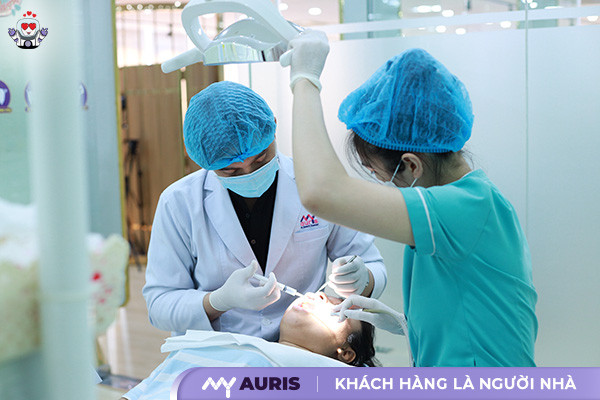
When to return to the dental clinic if porcelain crowns/veneers are still sensitive?
Here are specific signs indicating that you need to return to the dental clinic if you are in the post-porcelain crowning period:
Sensitivity lasting more than 7 days
If your teeth are still sensitive after a week when eating or drinking, especially with cold or hot items, you should not wait any longer. Your oral system might be reacting to the dental cement, or the crown may have high thermal conductivity, affecting the tooth pulp.
Severe sensitivity accompanied by continuous pain
If the sensitivity turns into a dull ache or continuous throbbing pain, the tooth might have pulp inflammation, or the initial tooth preparation process was too invasive. This is a common symptom in cases of incorrectly performed porcelain dental restorations.
Pain when chewing, biting, inability to eat hard foods
When a crown is not fitted correctly with the bite alignment or is misaligned, the patient will feel their teeth ‘clash’ during chewing. This can compress gum tissue, easily leading to periodontitis and severe sensitivity.
Swollen, red, bleeding gums with bad odor
If the porcelain crown does not fit snugly against the gums, it creates a gap where plaque can accumulate. This is an ideal condition for bacteria to grow, causing gingivitis and periodontitis, which leads to increased tooth sensitivity.
Loose or wobbly crown, or a feeling of discomfort/bulkiness
A loose crown is a sign that the dental cement is not durable or the wrong material was used. In such cases, the crown is unstable and causes discomfort, sensitivity, and a loss of secure feeling when chewing. Allowing this condition to persist can affect the entire stomatognathic system.
Properly performed porcelain crown/veneer placement should not cause prolonged sensitivity. If it does, you are likely experiencing issues with the crowning technique, improperly treated pulp, or an incompatible crown structure. Choose a reputable general dental service with experienced dentists and modern endodontic equipment to ensure effective treatment and long-term comfort while eating.
Read more: Is Porcelain Crowning Painful? – Effective Solutions

My Auris Dental Clinic – Reputable, Safe, and Quality Porcelain Crown/Veneer Destination
Established in 2019 with the mission of creating perfect smiles for Vietnamese people, My Auris Dental Clinic has always been trusted by customers for their aesthetic dental needs. With professional, dedicated, and transparent porcelain crowning services, My Auris is committed to providing a safe and high-quality experience.
Why choose My Auris Dental Clinic for porcelain crowns/veneers?
- Professional team of dentists: All dentists at My Auris are graduates of official medical universities, have many years of experience, and have studied abroad. With a dedicated and attentive work ethic, customers always receive the best care.
- High-quality porcelain crowns/veneers: We offer a variety of porcelain crown/veneer types originating from Japan, the USA, the UK, and Germany, featuring excellent aesthetics, high durability, and perfect bite force resistance.
- Modern equipment, advanced technology: Our entire system of dental aesthetic machinery and technology is continuously updated to ensure the porcelain crowning process is fast, precise, and minimizes sensitivity.
- Standard medical procedures, absolute safety: All dental aesthetic procedures are carried out according to strict standards, ensuring oral health and delivering bright white teeth with a distinct demeanor.
- Transparent porcelain crown/veneer costs, many attractive offers: Service prices are clearly publicized, along with numerous promotional programs to help customers easily access high-quality services.
If you are looking for a reputable, professional dental clinic for porcelain crowns/veneers, My Auris Dental Clinic is the perfect choice. Contact hotline 0377.99.6879 and experience international standard service today!


